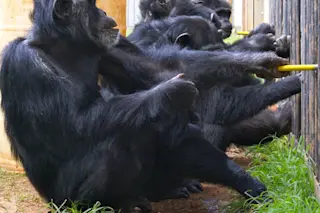Three chimpanzees pull at the cooperation apparatus, with two others looking on. (Credit: Courtesy of Frans de Waal, Yerkes National Primate Research Center) Chimpanzees are known to be violently competitive in groups — they aren’t exactly team players. But given enough time, it appears they can work together to stifle competition, police freeloaders and cooperatively accomplish a task. Doesn’t that sound familiar? Human society works because we all agree on certain social norms, and we hold each other to them. The old argument is that our ability to make society work by deploying these enforcement mechanisms is a uniquely human skill set. But according to a study published Monday in Proceedings of the National Academy of Sciences, our closest relatives use some of the same social strategies that we previously thought made us special, which means those behaviors may be a much older product of our evolutionary history.
Animal behavior ...














